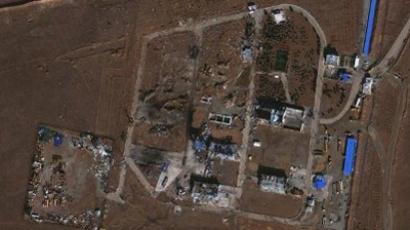Iranian ultimatum: Yield now or be attacked by year’s end
The US wants Russia to deliver a message to Iran: Tehran has one last chance for talks. If it is wasted, an attack will happen in a matter of months, according to Russian diplomatic sources.
The threat was voiced by US Secretary of State Hillary Clinton during a meeting with her Russian counterpart Sergey Lavrov in New York on Monday, a diplomatic insider told Kommersant daily.“The invasion will happen before year’s end. The Israelis are de facto blackmailing Obama. They’ve put him in this interesting position – either he supports the war or loses the support of the Jewish lobby,” the diplomat told the Russian newspaper.The source said Washington has given Tehran one last chance to solve the conflict peacefully and wants Moscow to deliver the message. Iran has to make progress with the P5+1 group, which consists of the five permanent members of the UN Security Council and Germany.The group is to negotiate Iran’s controversial nuclear program with Iranian officials sometime in April. The exact timing and place of the talks are still under consideration. The negotiators want clarity from Iran over the potential militarization of its nuclear program. They also demand access for International Atomic Energy Agency (IAEA) inspectors to a suspected nuclear site in Parchin.Such an inspection took place in 2005 and nothing suspicious was found. But now the nuclear watchdog believes Iran is using the military complex to test technology needed to trigger a nuclear device. IAEA monitors were barred form visiting part of the facility during their latest visit, prompting accusations that Iran may be trying to cover-up evidence of wrong-doing. Tehran dismissed the allegations and promised to let inspectors in.When asked about the reported American ultimatum, Russian Deputy Foreign Minister Sergey Ryabkov criticized the “last chance” rhetoric.“Speaking in this way is unprofessional. There is no such thing as a last chance. It’s an issue of political will, and Russia does everything to foster such will rather than let it wane,” he told the newspaper.The diplomat added that the negative trend in the conflict is apparent, suggesting that “those tempted to use military force should restrain themselves and search for a diplomatic solution.”“A war will not solve any problems, but will create a million new ones,” Ryabkov warned.
War contingency on the table
As military action becomes more likely, Russia is preparing a contingency plan for the negative scenario. Military and law enforcement agencies are bracing for a likely inflow of refugees to its neighboring countries, and possibly southern Russia as well. The exact details of the plan are classified, but its existence was confirmed by both military and civilian sources.Moscow is not just concerned by the humanitarian disaster war with Iran would bring to its southern borders. There are also fears it could reignite old conflicts in the region, like the row between Armenia and Azerbaijan over Nagorno Karabakh. “We may have to block some breaches. That may cost us our soldiers’ lives,” a military insider told Kommersant.In Israel, meanwhile, there is growing discontent with the government’s saber-rattling rhetoric, RT’s Paula Slier reports. Israelis fears the consequences of retaliation should Tel-Aviv chose to deliver a pre-emptive stake on Iran’s nuclear sites.“There’s no logic in attacking Iran. But we have a government that’s done some illogical things. And that’s really frightening,” Sharon Dolev, an activist from the Israeli Disarmament Movement, told RT.Israeli Prime Minister Benjamin Netanyahu said during his resent visit to the US that Israel will unilaterally decide on when to start military action against Iran. For his part, US President Barack Obama was trying to talk Netanyahu out of recklessly using force, saying a diplomatic solution is possible.Israel believes that Iran is trying to build a nuclear weapon under the guise of its civilian nuclear program. Tehran denies the allegation, insisting that all its nuclear activities are purely peaceful. All evidence of Iran’s nuclear ambitions is thus far circumstantial.














